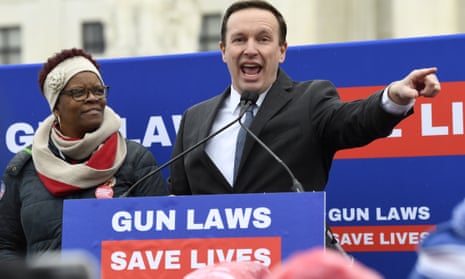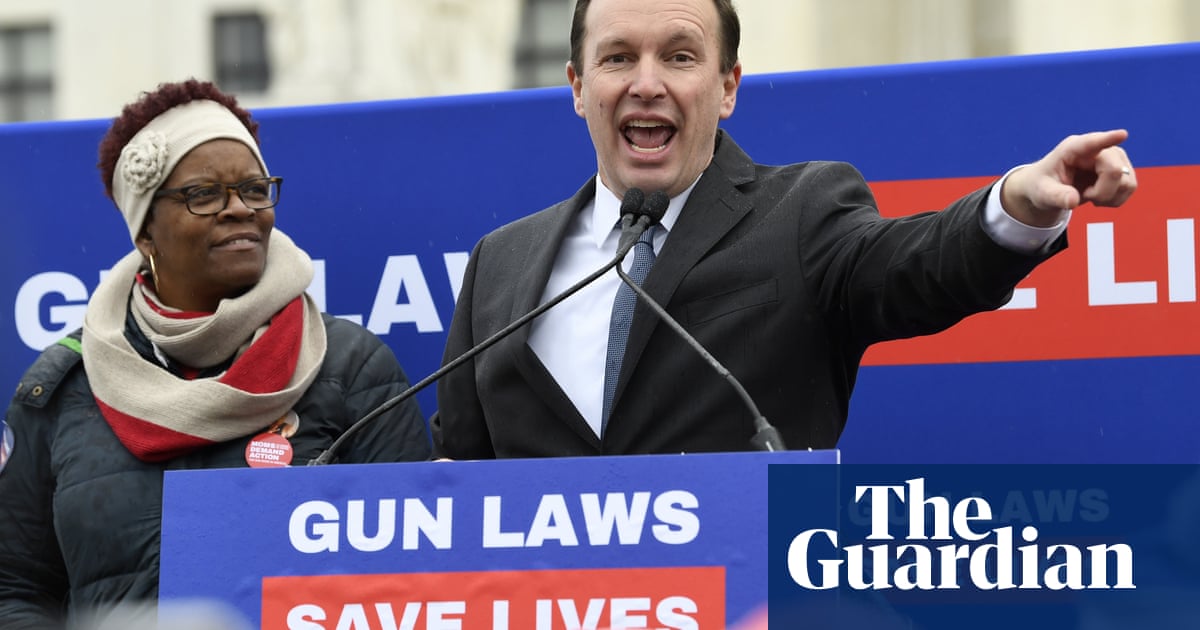Senator Chris Murphy: ‘victory after victory’ is coming for US gun safety
A decade after the Sandy Hook shooting, the Democrat believes the US is ready to embrace change around firearms

Senator Chris Murphy believes that the tide is finally turning in favor of the gun safety movement in America.
Even as Murphy acknowledges that more work is needed to address gun violence, the prominent Connecticut Democrat maintains that a growing backlash to mass shootings has brought the country to the brink of a sea change – 10 years after the devastating Sandy Hook school shooting in his home state.
“We’ve built a movement in this country in the last 10 years that today, I would argue, is more powerful than the gun lobby,” Murphy said in an interview for a special episode of the Guardian’s Politics Weekly America podcast.
“I think we are now poised to rack up victory after victory for gun safety,” he said.
That reinvigorated movement emerged in the aftermath of the Newtown shooting and grew as subsequent atrocities sparked new activist groups and campaigns. Murphy still vividly remembers where he was when he got the news on 14 December 2012, that a shooter had attacked Sandy Hook elementary school. He was on a train platform in Bridgeport, Connecticut, preparing to take his family to New York to see the holiday decorations, when his chief of staff gave him the first fragments of news.
“At first I thought it was a workplace shooting,” Murphy said. “But then, shortly before the train arrived, [we] got the news that there were children involved.”
Murphy soon learned that 20 young children and six staff had been killed at the school.
The tragedy stunned the country but spurred millions of Americans to demand changes to gun laws, with Murphy playing a central role in the efforts.
Since Sandy Hook, each time another mass shooting occurred, Murphy has taken to the Senate floor to urge his colleagues to act.
“What are we doing? Why are you here if not to solve a problem as existential as this?” Murphy demanded just this May, after a gunman killed 19 children and two educators at a school in Uvalde, Texas, and a racism-driven mass shooting occurred in Buffalo, New York, the same month.
“I‘m here on this floor to beg, to literally get down on my hands and knees and beg my colleagues: find a path forward here,” Murphy said.
Murphy’s pleas for action and growing public outrage and activism finally produced results, as the Senate this year passed the Bipartisan Safer Communities Act (BSCA). Joe Biden signed the bill in June, marking the first time in nearly 30 years that the US approved a new major federal gun law. The BSCA expanded background checks for the youngest gun buyers and allocated funding for mental health and crisis intervention programs, among other initiatives.
A number of policies demanded by gun safety advocates, including an assault weapons ban, did not make it into the BSCA. But Murphy and his allies point to the legislation, along with widespread public support for proposals like universal background checks, to argue that America is finally ready to make significant changes.
The road ahead is still difficult. In just the few weeks since Murphy spoke to the Guardian, several more mass shootings occurred, from Colorado to Virginia.
Murphy is the first to admit that it will take some time for the new federal law and other state policies to take effect, and more action is needed.
“We haven’t seen the murder rates or the pace of mass shootings reduce. [But] once these laws start to get passed and put into place, I hope that we’re going to see some real returns,” Murphy said.
Gun safety advocates insist that more regulations can result in fewer gun deaths. One study by the group Everytown for Gun Safety non-profit found a direct correlation between states with weaker gun laws and states with the highest levels of deaths caused by guns, including homicides, suicides and accidental killings.
Even so, Republican lawmakers remain largely opposed to reforming federal gun policy. Fifteen Republican senators voted for the BSCA, ensuring enough support to overcome a filibuster. But more than two-thirds of Senate Republicans still opposed it. In the House, 193 Republicans voted against the BSCA, while just 14 of them joined Democrats in supporting it.
Republicans’ broad opposition will make it extremely difficult to enact additional gun laws in the near future, especially after the party took control of the House in November’s midterm elections.
Murphy concedes that Senate Democrats do not currently have the votes to pass an assault weapons ban.
Still, he sees encouraging signs that more Republicans are willing to defy the National Rifle Association (NRA) on gun-related votes. For years, the NRA appeared to have an unshakable hold on the party, using its influence to block any gun bill.
“Ten years ago, it would have been unthinkable for a gun safety bill to pass the Senate with NRA opposition,” Murphy said. “Now, a whole bunch of Republican senators know that the NRA does not even represent gun owners any longer. And thus, they’re not paying as much attention.”
But even as the NRA’s influence on the public and the GOP has waned, the anti-gun violence movement has encountered new hurdles. Earlier this year, the conservative-leaning US supreme Court struck down a New York law that strictly regulated carrying firearms outside the home, jeopardizing similar state policies across the country.
The gun death rate also hit a 30-year high last year, as research suggests that a growing number of Americans are carrying firearms on a daily basis. And as more states allow residents to openly carry, guns are becoming a common fixture at rightwing political protests.
Murphy is hopeful, however. If the 10 years between 2012 and 2022 were defined by many disappointing losses for the movement, Murphy predicts more positive change ahead.
“I think you will see steady progress,” he said. “It won’t be everything that I want. We won’t get a ban on assault weapons overnight, but we’ll make regular progress. And that, I think, is what will define the next decade.”

